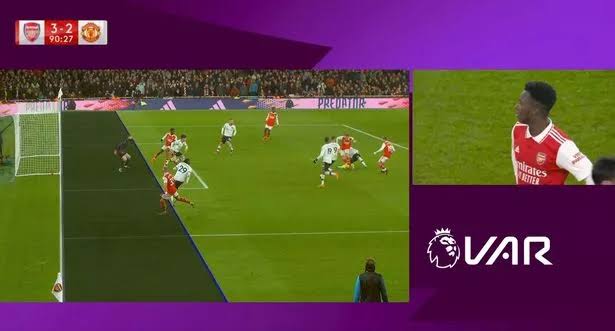The catalyst for the outcry came in the dying moments of a fiercely contested encounter at Old Trafford, where Arsenal secured a narrow victory courtesy of a goal that was hotly disputed by Manchester United fans.
Replays showed that the winning goal, scored in stoppage time, was preceded by an offside infringement, sparking uproar among the home faithful who felt aggrieved by the perceived injustice.
In the immediate aftermath of the match, social media platforms were flooded with impassioned pleas and accusations from Manchester United supporters, many of whom lambasted the Premier League for what they perceived to be a deliberate attempt to influence the outcome of the game.
Hashtags such as #PremierLeagueManipulation and #JusticeForUnited began trending as fans vented their frustration and disbelief at the controversial officiating decision.
Adding fuel to the fire were allegations of favoritism towards Arsenal, with some Manchester United supporters citing a series of perceived injustices and questionable calls that they believe have tilted the scales in favor of their North London rivals.
From contentious penalty decisions to dubious red card incidents, the sense of injustice among Red Devils fans has only been compounded by what they see as a pattern of biased refereeing throughout the season.
In a scathing statement released shortly after the match, the Manchester United Supporters’ Trust (MUST) condemned the Premier League’s handling of the situation, accusing the governing body of undermining the integrity of the competition and eroding trust among fans.
The statement called for a thorough investigation into the incident and demanded accountability from those responsible for overseeing match officiating.
The controversy surrounding the Arsenal match has reignited long-standing debates about the transparency and accountability of refereeing decisions in English football, with calls for the introduction of video assistant referees (VAR) and greater oversight of officiating standards.
Critics argue that the current system is prone to human error and inconsistency, leading to instances where the outcome of matches is decided by subjective interpretations rather than objective assessments of the rules.
As tensions continue to simmer, the Premier League faces mounting pressure to address the concerns of Manchester United supporters and restore confidence in the integrity of the competition.
With emotions running high and accusations flying, the fallout from the controversial offside decision threatens to cast a shadow over the remainder of the season and reignite debates about the role of officiating in shaping the outcome of matches.
